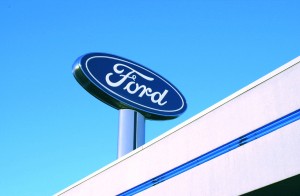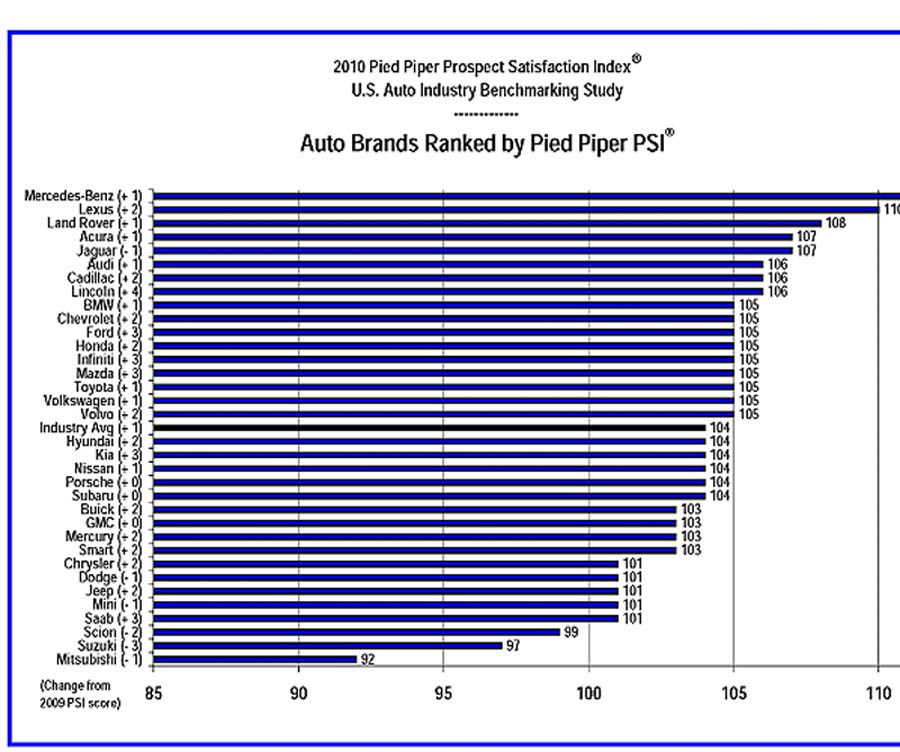Product, product, product? Perhaps, but even the best vehicles won’t sell unless dealers know how to work with their customers, and according to a new study, Mercedes-Benz leads the way when it comes to doing the best job on the showroom floor.
Not surprisingly, luxury makers lead the way when it comes to satisfying customers during the shopping experience, according to the latest annual Pied Piper Prospect Satisfaction Index, which uses a cadre of “mystery shoppers” to see how dealers across the country perform. Lexus ranked second, in the PSI, with Land Rover, Acura and Jaguar rounding out the Top Five.
But Detroit brands lead the way, in the 2010 study, when it comes to improving the way their dealers work with customers. Ford, Lincoln and Chevrolet all scored above industry average for the first time since the study was launched, four years ago. In fact, Chevy was the only mainstream brand in the Top Ten, followed by Ford and Honda.
“Overall industry performance improved notably from 2009 to 2010, with 25 of the 34 major auto brands achieving higher PSI scores,” said Fran O’Hagan, CEO of California-based Pied Piper Management. But he added that, “Despite the continual improvement in how cars are sold, there is still plenty of room for improvement, although not necessarily in the expected areas.”
Take the typically overbearing car salesman, the butt of a thousand jokes – never mind a few movies. They’ve handed in their plaid jackets and apparently gone on to other jobs, apparently. Pied Piper’s mystery shoppers experienced that sort of salesperson just 6% of the time. On the other hand, 18% of the shoppers said they experienced sales people who were indifferent and uninterested, a bit of a surprise considering the automotive sales slump.
“Today’s car shoppers are armed with far more vehicle and pricing information than ever before,” noted O’Hagan, but that doesn’t mean they don’t need help while shopping. And mistake many sales people make is failing to provide brochures to shoppers, something O’Hagan says he is “absolutely certain” improves the odds of selling a car.
Industry-wide, the numbers of salesmen offering brochures has steadily dropped, and is now down to just 57%, according to the latest Prospect Satisfaction Index, or PSI.
There are distinct differences between brands, the latest study shows. At Lexus and Porsche showrooms, sales people will demonstrate the controls and features of a new model 95% of the time before taking a prospect out for a test drive. At BMW that occurs only 74% of the time.
Follow-up calls are highly effective at closing a deal, research has long shown. The PSI found Nissan, Mazda, Infiniti, Mercedes, Toyota and Volkswagen the brands most likely to have dealers who call prospects back within 48 hours. Buick, Chevy, Mitsubishi and Acura sales people were least likely.
The Prospect Satisfaction Index was calculated using the data collected by 3,658 mystery shoppers who visited showrooms across the U.S. between July 2009 and June 2010. They were assigned to observe 50 different aspects of the sales process, such as how aggressive – or passive – a salesperson behaved, whether they provided a brochure, offered a brochure, or showed off the features of a vehicle.
The study bears out claims by dealer advocates that the showroom sales process has changed significantly over the last several decades, though it indicates that some brands have evolved far more effectively than others.
Expecting good treatment from luxury brands is “something we’re all getting used to,” noted O’Hagan. But Ford is an example of how a mainstream brand can improve, he said, noting that compared to just three years ago, its sales people are 52% more likely now to discuss features that are unique from the competition, and 23% more likely to focus on the three to five memorable features or benefits most relevant to the individual shopper.
Other mainstream makers are hoping to use the sales experience to improve their performance, Hyundai in particular. The maker plans to take a very different approach to retailing its new flagship sedan, the Equus, when it reaches market a year from now. To take on competitors like the BMW 7-Series and Mercedes S-Class, the Korean carmaker will offer Equus shoppers the opportunity to have a sales person come to them, whether at home or office. That’s a common practice in Japan, but rare in the rest of the world.
“Successful brands and dealerships have responded by acting as helpful enablers for today’s shoppers,” said O’Hagan. “At the most successful dealerships, the stereotype of the old-fashioned car salesperson no longer exists.”


